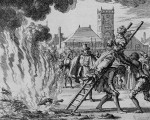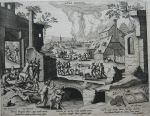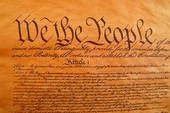This blog has been lurking around in the corners of my mind for quite a while now, ever since July 1, 2016 when I passed a church bulletin calling for all to come to its celebration of God and America. This sign bothered me for several reasons. Of course, me being an atheist will probably cause most to figure out some of the reasons it bothered me. But only some. As for the rest, well, the rest I thought would be surprising and I hope interesting.
It bothered me because not only is such a mingling of church and state bad for the state, but it is just as bad for the church.

Let me first say that this church, and the many others that I saw with a similar message, have every right to do so. However, not everything that is legal and that people have a right to do is also wise. And in this blog I plan to discuss why it is not wise for a religion, in this case Christianity, to mix religion and nationalism. To do so, I will speak as if I were a much younger me, young enough to still be a Christian.
Let’s start with a question – what is the purpose of the Church?
Answer, to spread the good news of the Gospels, the news about Jesus and his redemptive death and resurrection. The church was also meant to provide support and teaching to fellow Christians, and to those who come to its doors seeking. And the church was also meant to serve as a moral guide and conscience of people, of societies, of nations, of the world.
While spreading the news of the Gospels might be easier done when part of a government, as part of the inside group, it does so at the expense of corrupting the church, and of causing great pain and suffering to others outside of that church.
A church is not the state. Nor is it meant to be. It is not meant to be a supporter of the state, an auxiliary of the state, a co-ruler with the state.
A church is meant to be an outsider in regards to government.
Christianity was born an outsider.
Jesus was born an outsider with Mary being pregnant before being married
Jesus was born into and preached to a people who were outsiders, the Jews.
Jesus served the outsiders among the Jews; tax collectors, the lepers, the unclean, the sinners.
An outsider preaching to a people of outsiders, that is part of what gave Jesus’ message its power. His message was not to the rich and powerful, although it was theirs for the taking should they choose to listen. His message was to the poor and powerless.
His message was not how to create a civil society, how to govern a country or state or city. His message was about God’s love for humanity and how best to receive and spread that love. It was a message of hope, not political positions.
Jesus, as the outsider, accepted all, but did not change his message, his standards, nor himself for any.
Jesus changed the world.
From its birth to its early years, Christianity was a religion off outsiders looking in. Often ridiculed, sometimes persecuted, they nonetheless still for the most part, held firm to their standards and beliefs. And they grew.
And then came the great split. No, not the Catholic and the Protestant split. Nor the disagreements among Christians, which had been present since the beginning as can be seen in the arguments about the nature of Jesus and his relation to God.
No, the great split I am referring to concerns the split from being outsiders to becoming insiders. The conversion of Emperor Constantine transformed Christianity from being a religion of outsiders to being a religion of the insiders, of those with power and money. Or rather, one particular set of Christians became insiders. As part of the bargain, with Constantine, they had to have a uniform set of beliefs. So, one set modified some of their beliefs and won, the others became persecuted and died, along with the pagans.
As Paul Johnson wrote in his A History of Christianity:
How could the Christian Church, apparently quite willingly, accommodate this weird megalomaniac in its theocratic system? Was there a conscious bargain? Which side benefited most from this unseemly marriage between Church and State? Or, to put it another way, did the empire surrender to Christianity, or did Christianity prostitute itself to the empire?”
Now, instead of criticizing the government and society, Christianity and the government  were one, and actions against the government were also actions against Christianity, and actions against Christianity were also actions against the government. Given this, how could most Christians criticize any government action, no matter how bad or how flawed? How could any government allow any deviation from the established religion, no matter how well argued and supported?
were one, and actions against the government were also actions against Christianity, and actions against Christianity were also actions against the government. Given this, how could most Christians criticize any government action, no matter how bad or how flawed? How could any government allow any deviation from the established religion, no matter how well argued and supported?
They couldn’t
An attack on the religion supported by the state was an attack on the state, and an attack  on the state was an attack on the religion. Such was the root cause of most of the religious violence and persecution throughout the years; the Inquisition, the forced conversion and persecution of the Jews, Catholics vs. Protestants, Protestants vs. Puritans, Puritans vs. Quakers, and on and on and on.
on the state was an attack on the religion. Such was the root cause of most of the religious violence and persecution throughout the years; the Inquisition, the forced conversion and persecution of the Jews, Catholics vs. Protestants, Protestants vs. Puritans, Puritans vs. Quakers, and on and on and on.
In addition to the violence against people, was the violence done to beliefs and morals as Churches assumed stately power. Compromises with principles and beliefs were common, as were the flat out ignoring of such principles and beliefs.
This violence against people and against the teachings of Jesus and of God is probably why the first person to propose an absolute and total separation of church and state was a Puritan theologian and the founder of the Baptist Church in America – Roger Williams. And he lived up to that ideal when he founded the state of Rhode Island.
The United States was the first secular government in the world. Something that the writers of the Constitution did intentionally, and with great forethought.

Their foresight and awareness of history is something lacking today by too many Americans, and is evidenced by so much more than just the signs I saw that inspired this blog. This lack of forethought and awareness is seen whenever anyone:
- Claims that the United States is a Christian country. And then advocates for laws to make it so – prayer in the schools, recognition of the Bible as the state book, etc.
- Work to limit or take away the rights of those who are not the right sort of Christian or believer.
- Tells Muslims to go home, even those who were born in the United States. And then tries to make it so.
- Whenever permits are denied to religious groups due to their beliefs.
- When President H. Bush commented that atheist could not be patriots due to not believing in God.
- When Trump sends out a White House bulletin in which he states “America is a Nation of believers. As long as we have faith in each other, and trust in God, we will succeed!”
We, as a nation, as a people, have never been very good at remembering. But, today, that

lack of memory, of awareness, seems stronger than ever. The evangelical support forTrump shows how far too many Christians and Christian organizations, are willing to go in dealing with the devil in order to gain political power. And how many of their values and morals, and how much of the teachings of Jesus they are willing to ignore or give up in their quest for political power.
I think that they need to go back and read the history of religion, and of what happens when it becomes part of the state. Some Madison, or Jefferson, or several others would be good. But, perhaps, it would be best if they rediscovered the writings and thought of Roger Williams. Before they manage to harm not just people, but the Constitution that will allow such harm to, eventually, be redressed.



